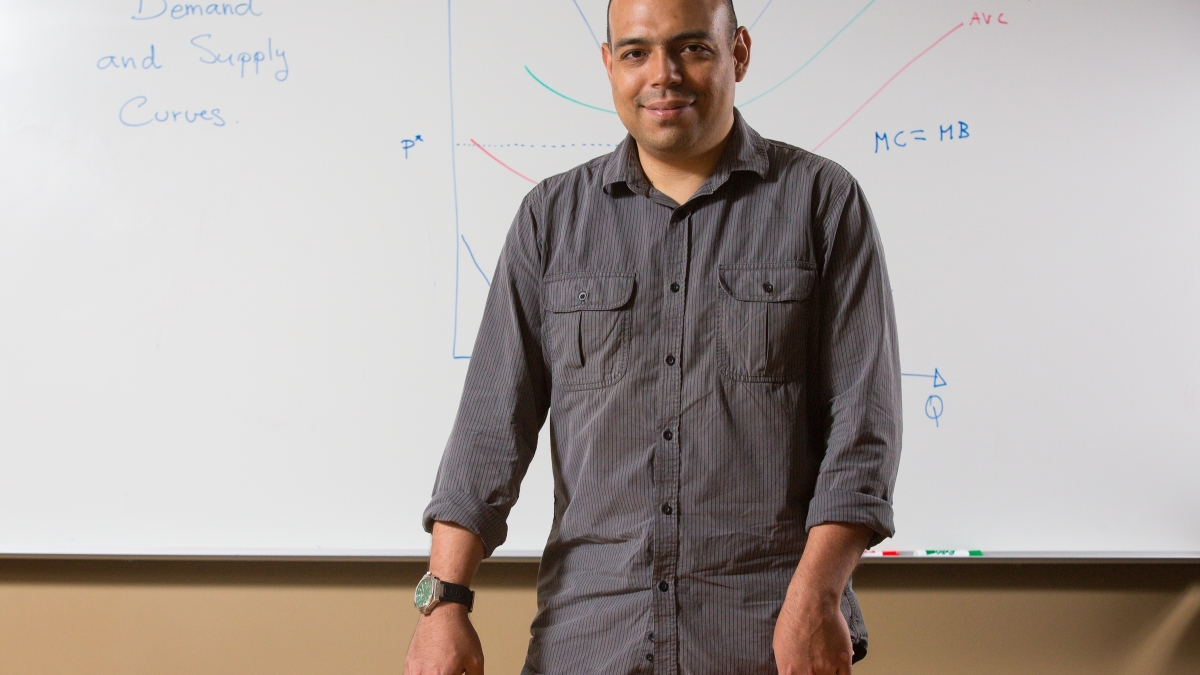Teaching is a two-way street for Allan Hernandez.
“I don’t like to think that when you’re a professor there is a thick window between you and the students. I learn from the students as much as they are learning from me,” said Hernandez, who won the award as the top teaching assistant from the Graduate and Professional Student Association at Arizona State University.
“With technology, they are like that,” he said, snapping his fingers.
Hernandez is a doctoral student in economics in the W. P. Carey School of Business and taught introductory microeconomics to about 500 undergraduates this semester.
Many graduate students must teach introductory courses to undergraduates, but not everyone embraces it.
“I don’t see teaching as a burden. I think it is a rewarding experience,” Hernandez said.
Hernandez, who earned his undergraduate and master’s degrees at the University of Costa Rica, previously taught economics and math in his native country, where classes typically are much smaller.
“Here you have an auditorium and you have to use a microphone,” he said. “You have to get their attention and make eye contact. You need to make sure you’re not only connecting with the guys in the center.
“And you have to encourage them to ask questions. These classes are so large that they’re afraid if they ask a question they’ll look stupid.
“But because it’s an introductory class, we had biology majors, communication majors — and everybody brought their own approach and could learn from that."
Hernandez was the teaching assistant for Nancy Roberts, professor emeritus, who taught the course.
“He’s a very good researcher, and a lot of people are just worried about research. He’s also interested in teaching,” Roberts said.
“He’s very personable and the students like him, but he doesn’t baby them.”
For his dissertation, Hernandez researched centralized college-admissions systems. Unlike in the United States, many countries, including China and Japan, require high school students to rank their preferred universities and their preferred majors. The students are then assigned a university and a major, which may not be their top choice. Hernandez set up an algorithm that universities can use to more closely match students’ choices.
“The idea is to see what the actual mechanism is doing and what do students prefer, and if there is a big misalignment, that is bad. It’s bad for the university because you’re putting a lot of money into a student who may not be happy,” Hernande said.
This summer, after doing research at the University of Warwick in England, he will return to ASU to teach the math boot camp for doctoral students.
"I find it very interesting to teach the complicated stuff for people who already have a bachelor's or a master's in math and then teach a class of basic principles to freshmen and sophomores."
Hernandez, who hopes to get a position as a research and teaching professor after he earns his doctorate, said he’s honored to win the award and is happy that the Graduate and Professional Student Association recognizes assistants.
“It puts teaching up where it belongs.”
More Arts, humanities and education

ASU professor's project helps students learn complex topics
One of Arizona State University’s top professors is using her signature research project to improve how college students learn science, technology, engineering, math and medicine.Micki Chi, who is a…

Award-winning playwright shares her scriptwriting process with ASU students
Actions speak louder than words. That’s why award-winning playwright Y York is workshopping her latest play, "Becoming Awesome," with actors at Arizona State University this week. “I want…

Exceeding great expectations in downtown Mesa
Anyone visiting downtown Mesa over the past couple of years has a lot to rave about: The bevy of restaurants, unique local shops, entertainment venues and inviting spaces that beg for attention from…


